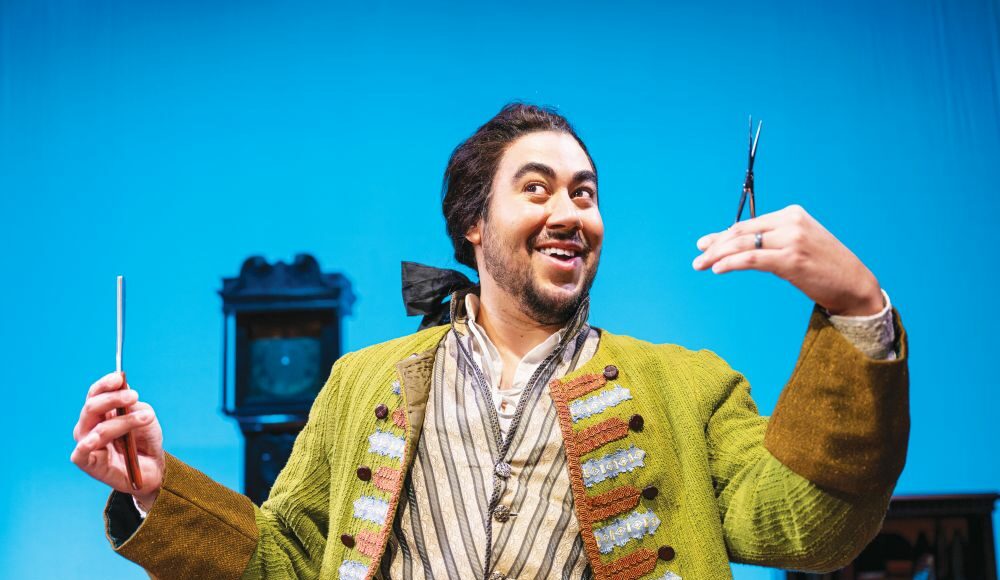Even those possessing little more than a passing familiarity with opera will recognize parts of The Barber of Seville. Composed by Gioachino Rossini and premiering in Rome in 1816, the opera buffa (comic opera) is among the most beloved works of the genre.
The work’s influence has become part of popular culture: as Stephen Lawless, stage director of Opera San José’s production of The Barber of Seville notes, “every day you put the TV on, there’s an advert that features the Figaro aria [‘Largo al factotum’] somewhere.”
Lawless notes, too, that music from the opera found extensive usage in Bugs Bunny and Tom and Jerry cartoons, bringing that spirited variety of classical music to successive generations. “The music just bubbles,” Lawless says. “It’s full of that Mediterranean warmth and joy.”
Lawless–who makes his Opera San José debut with this–has directed well over 100 productions. He got his start at age 19 as a stage manager for famed composer-conductor Benjamin Britten, going on to direct performances all over the globe. But he points to an earlier experience that opened him up to the power and wonder of live performance.
“I grew up near Stratford-Upon-Avon,” he explains. “My school used to go see the Royal Shakespeare Company.” In his final year of school, Lawless was in the audience for what he characterizes as an “abstract” RSC production of Richard II. “I was aware for the first time that the event was being–I can only use this word–manipulated by somebody,” he says. “And that was the director.”
Lawless says that singular experience inspired him into the world of directing “because I saw the possibilities of what a director could do, could be.” And Lawless brings that sense of enthusiasm and adventure to the OSJ production of The Barber of Seville.
The performance, which runs November 11-26, stars Ricardo José Rivera as the scheming Figaro; Dale Travis as Dr. Bartolo, possessive guardian of lovestruck Rosina (Nikola Adele Printz); and Joshua Sanders as Rosina’s suitor Count Almaviva. OSJ Director of Music Joseph Marcheso conducts the comic opera.
Asked what sets Opera San José apart from the many companies with which he has worked, Lawless doesn’t hesitate. “Shawna Lucey,” he says. General Director and CEO of OSJ, Lucey’s extensive prior experience includes several years as Lawless’ assistant. “She studied in Russia, and she came with me to the Bolshoi,” he says. He admits that if anyone other than Lucey has asked him to direct The Barber of Seville, “I probably would have said no, because I did endless revivals of it. I thought I’d had my fill of it.”
The last time Lawless directed the opera was in the mid 1990s in Belfast, “between bombings of the opera house,” he recalls. “Going back to it now has been a real revelation,” he says. “There’s much more to it than I remember from doing it nearly 30 years ago.” Lawless believes that there are many things special about The Barber of Seville that set it apart from other operas.
“First,” he says with a chuckle, “it’s shortish, and there’s not a huge chorus involved.” So production is less of an uphill climb than, say, Mozart’s The Magic Flute. More importantly, though, the 207-year old work explores timeless themes. “It’s fundamentally about class,” Lawless says. “It’s about how people with money use people without money–who want money–to further their ends.” He describes the tone of The Barber of Seville as “joyously cynical about human behavior. And I think that its comedy has worn well.”
Lawless promises that attendees who have seen performances of Rossini’s opera before can expect something new with the OSJ production. “There are only a small number of operas regularly performed all over the world: 30, absolute tops,” he says. “The duty of people like myself, the conductor and the cast is to reinvent them every time so that there is a freshness. After 200 years of crud has accumulated on the piece, we scrape some of that away!”
Lawless’ enthusiasm for the work seemingly knows no bounds. And he believes that The Barber of Seville can serve as the perfect introduction for someone who’s never seen an opera performance. “Opera is the amalgamation of all the art forms: painting, music, drama,” he enthuses. “It is the toughest and the greatest of all the art forms. We have a great cast and everything else. And when opera works, there is nothing better.”
The Barber of Seville
Nov. 11–26



